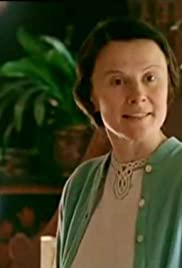
AFTER THE FUNERAL
UK, 2006, 93 minutes, Colour.
David Suchet, Robert Bathurst, John Carson, Anna Calder- Marshall, Michael Fassbender, Fiona Glascott, Geraldine James, Julian Ovenden, Lucy Punch, William Russell, Monica Dolan.
Directed by Maurice Phillips.
After the Funeral is an effective version of an Agatha Christie novel, one of the series on the television collection, with David Suchet as Poirot.
At first, there are not suspicions of the murder, the man who died known to be ill. However, when all the family gathers and there is the hearing of the will, there is a strong surprise, the presumptive heir being cut out of the will completely, the rest of the family inheriting instead. At the funeral, the dead man’s eccentric sister, whom no one has seen for 20 years, asks whether he was murdered.
The solicitor is puzzled and invokes the help of Poirot. He studies all the potential suspects, interrogations, visits.
The film has a very strong cast, David Suchet always excellent as Poirot, with Geraldine James as the anchor character in the house, an early film from Michael Fassbender as the heir, Lucy Punch as the missionary, and Anna Calder- Marshall as the wife of the dead man’s alienated brother. However, Monica Dolan steals the show with a dual performance.
There are great complications, especially dealing with art, paintings, greed and murder.
1. The popularity of Agatha Christie mysteries? Television series? David Suchet as Poirot?
2. The situation, the death, the funeral, the family assembled? The reading of the will? The surprises?
3. The British countryside, wealthy homes and grounds? The visit to the North? The musical score?
4. Poirot, the solicitor, the discussion on the train, observations of the family? Cora and the issue of whether Richard Abernathie was murdered?
5. Abernathie himself, his status, wealth, his family, his hostility towards his brother, Timothy? Timothy and Maud? George as the presumptive heir? The changing of the will?
Everybody else inheriting? Motivations?
6. Helen, her care for Richard, her character, at home, her love for George, relationship with Susanna, Rosamund and Michael? Possible motives?
7. George, his personality and character, the heir, his being ousted? His reactions, sullen manner, drinking? His visit to the North? The revelation of his relationship with Susanna? Their night together? George and his response? Susanna and her response? Guilt?
8. Susanna, devout, the African missions, the church, proper, her place in the family, relationships? The visit of the North? The revelation of her relationship with George? The consequences?
9. Timothy, cantankerous, hypochondriac, his relationship with Maude, bossing her about? His greed? Setting up the fake situation? In the wheelchair?
10. Rosamond, the theatre, her marriage to Michael, Poirot and his visit to the theatre, the discussions about production, ambitions, finance? Deception? Michael and his affair?
11. The images of nuns throughout the films? The theatre? In the town?
12. Cora, nobody seeing her for 20 years, her eccentricities, her eccentric behaviour at the funeral, suggesting that Richard was murdered? At home, her husband, the artist? Miss Gilchrist as a companion? After the funeral, her being found dead and battered? Her own paintings, the dating of the paintings? Poirot bringing in her husband as the art expert? The inconsistencies in the paintings of the dates, chorus and paintings?
13. Miss Gilchrist, mousy, demure, as a companion, her comments on Cora? The impact of the murder? The art, her paintings? The visits of the relations? The Rembrandt?
14. Everybody assembled, the revelation? Miss Gilchrist, the changing character, her impersonation of Cora, the true nature emerging, the angers, feeling deprived, the plan, the paintings, wealth?
15. The plot as an example of the least suspicious person being the murderer?